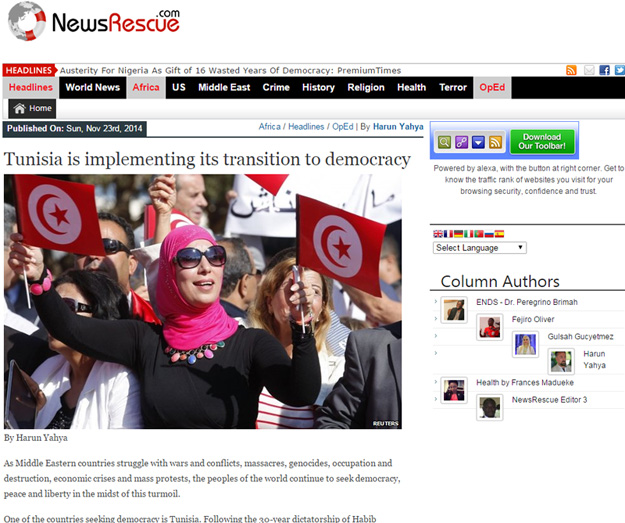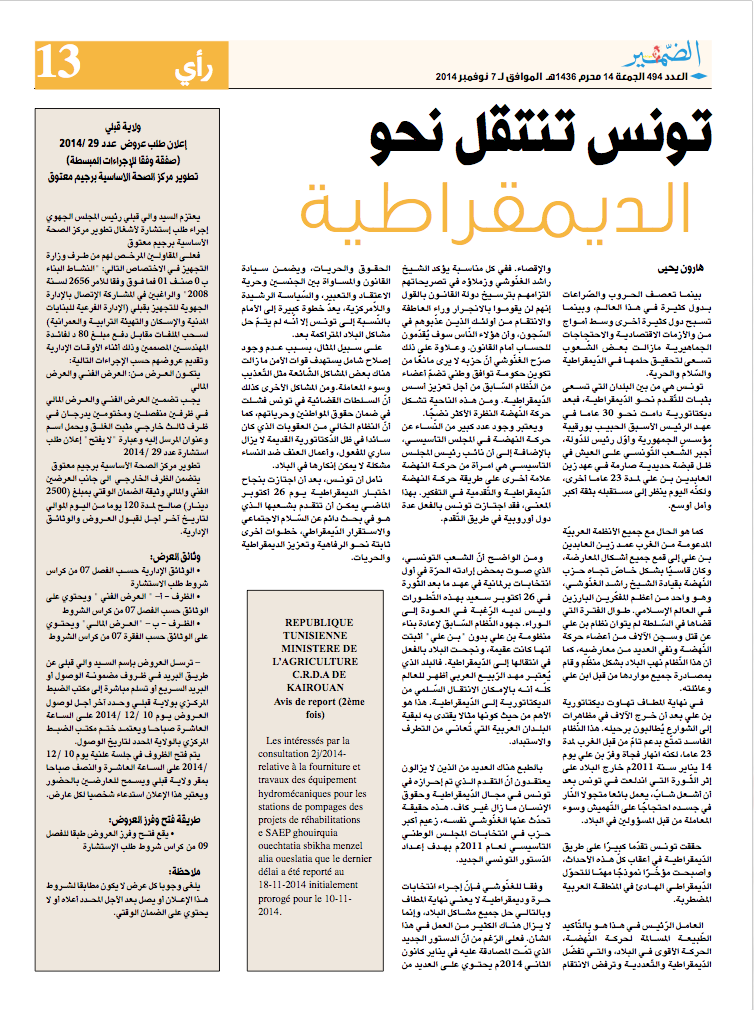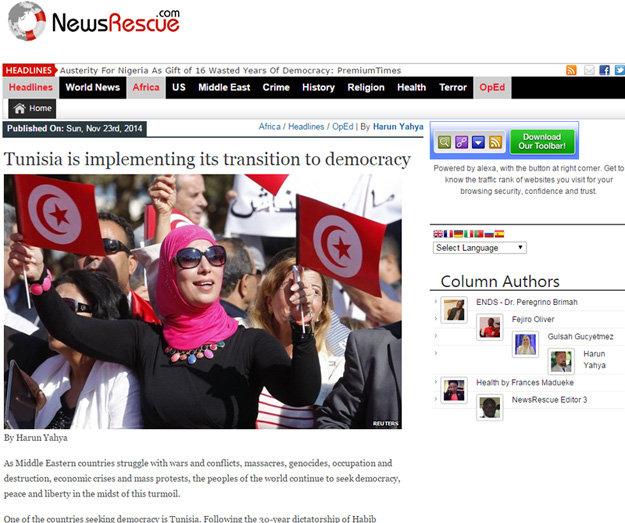
As Middle Eastern countries struggle with wars and conflicts, massacres, genocides, occupation and destruction, economic crises and mass protests, the peoples of the world continue to seek democracy, peace and liberty in the midst of this turmoil.
One of the countries seeking democracy is Tunisia. Following the 30-year dictatorship of Habib Bourghiba, the founder of the country and its first head of state, the people of Tunisia were then forced to live under the iron fist of Zeynel Abidin Bin Ali for another 23 years, but today they can look to their future with greater confidence.
As with all the Arab regimes backed by the West, Zeynel Abidin Bin Ali also banned all forms of opposition. He was particularly harsh towards the Ennahda Movement, under the leadership of Rashid al-Gannushi, one of the most eminent thinkers of the Islamic world. Throughout his time in power, the regime of Bin Ali murdered thousands of members of the Ennahda Movement and exiled many of its opponents, especially Rashid al-Gannushi. On the other hand, the country was systematically looted, with all its resources being confiscated by Bin Ali and his family. Eventually, the dictatorship of Bin Ali experienced the end all dictatorships are condemned to and was brought down by street protests involving hundreds of thousands of people. This perverse system, which enjoyed unmitigated support from the West for 23 years, came to an end with the overthrow of Bin Ali in an uprising resulting from the self-immolation of a young computer engineer protesting maltreatment by state officials on December 17th 2010, and with Bin Ali fleeing the country on January 14th, 2011.
Tunisia made great progress on the road to democracy in the wake of all these events, and has recently become an important model between the concept of East and West. The main factor in this is, of course, the peaceable nature of the Ennahda Movement, the most powerful movement in the country, which favors democracy and pluralism and refuses to act on vengeance. Rashid al-Gannushi and his colleagues take every opportunity to issue messages about a democratic state of law by saying they will not engage in an emotional demand for vengeance against those who tortured them in prison and that those people would only be held to account before the law. Moreover, al-Gannushi states that his party will happily form a coalition with parties containing members of the former regime in order to reinforce the foundations of democracy. In these respects, the Ennahda Movement is demonstrating a surprisingly positive outlook. The fact that 45 of the 89 deputies in Parliament are women, including one of the most important deputy prime ministers, is another sign of the Ennahda Movement’s democratic and progressive way of thinking. In that sense, Tunisia has already left several European countries way behind.
It is clear that the Tunisian people, who voted with their own free will in their first parliamentary elections in the post-revolution era on October 26, are happy with these developments and have no wish to go back. The efforts of the former regime’s to build a ‘Bin Ali regime’, (without Bin Ali), proved to be futile and the country successfully completed its transition to democracy. In this way, the country that is considered the cradle of the Arab Spring, has shown the whole world that it was possible to peacefully move from dictatorship to democracy. This is most important in terms of also setting an example to other countries that contain radical elements.
Of course there are many who still think that the progress made in Tunisia in the name of democracy and human rights is insufficient. This is a fact voiced primarily by Al-Gannushi himself, the leader of the largest party in the National Constituent Assembly elections held in 2011 to prepare the new Tunisian Constitution. According to al-Gannushi, the holding of elections does not mean that democracy is fully settled in the country, and there is still much progress to be made. Even though the ratification of the new Constitution in January – which contains numerous rights and freedoms and guarantees the supremacy of the law, equality between the sexes, freedom of belief and expression, rational politics and decentralization – was a major step forward for Tunisia, not every problem in the country has yet been solved. For example, since no comprehensive reform aimed at the security forces has been carried out, problems of torture and misconduct are still common; another problem is that the judicial authorities in Tunisia have failed to guarantee the rights and freedoms of citizens. The sanction-free system that prevailed under the old dictatorship is still in force and acts of violence against women are another worrying problem in the country. We hope that Tunisia, which successfully passed the democracy test last Sunday, can take its people, who are in search of social peace and democratic stability, another step closer to well-being and further its democracy in the process.
Adnan Oktar's piece on News Rescue:
http://newsrescue.com/tunisia-implementing-transition-democracy/#ixzz3KSYhwMYW



